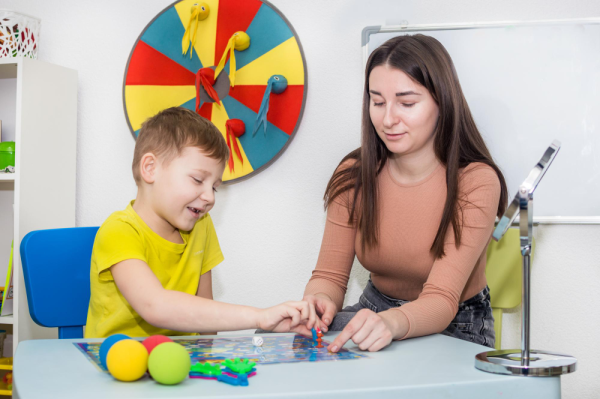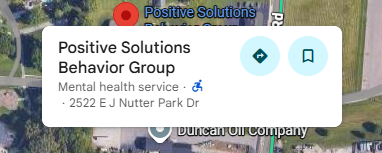ABA Therapy Gains Recognition in Early Childhood Care
ABA Therapy in early childhood fosters communication, social, and emotional skills through positive reinforcement, individualized plans, and collaboration, promoting confidence, independence, adaptability, and long-term developmental success.
Beavercreek, OH, United States, 25th Nov 2025 – ABA Therapy has increasingly become a central focus in early childhood development programs, gaining recognition for its structured and evidence-based approach. Through consistent behavioral techniques, it helps young children build essential communication, social, and learning skills that form the foundation for lifelong growth. Early intervention using ABA Therapy supports children in achieving developmental milestones at a pace suited to their individual needs. Educators and caregivers now view this method as an integral part of comprehensive care, emphasizing positive reinforcement and measurable progress. By integrating ABA Therapy into early childhood care, families and professionals can work together to create supportive environments that nurture confidence, independence, and lasting behavioral improvements during the most formative years of development.

Foundation of Behavioral Learning
ABA Therapy emphasizes understanding how behavior is influenced by environmental factors. In early childhood care, this foundation helps children recognize patterns, respond to guidance, and build positive habits that support emotional and social development. By observing actions and outcomes, caregivers can identify triggers and apply strategies that reinforce constructive behavior. This structured learning process allows children to experience gradual improvement while feeling supported and understood. The method’s consistent reinforcement helps establish routines that promote cooperation, focus, and adaptability throughout critical stages of early growth.

Encouraging Positive Development
Through carefully planned sessions, ABA Therapy focuses on rewarding desired behaviors rather than punishing undesired ones. This approach helps children associate learning with encouragement, building motivation and confidence in their daily interactions. Positive reinforcement is essential in shaping social and emotional development, guiding children to communicate needs and feelings effectively. In early childhood care settings, this promotes a nurturing atmosphere where children feel safe to explore and express themselves.
Nurturing Growth Through Positive Reinforcement
ABA Therapy promotes healthy development by encouraging desired behaviors through rewards. This positive focus helps children build self-esteem, confidence, and social awareness, creating an uplifting environment that supports learning and emotional growth during early childhood care experiences.
Building Confidence in Early Learners
By emphasizing praise over punishment, ABA Therapy helps children feel motivated and valued. Consistent positive reinforcement strengthens emotional resilience, encourages participation, and empowers children to develop self-control, communication skills, and independence throughout their early developmental stages.
Promoting Emotional and Social Balance
Through structured sessions, ABA Therapy guides children to express emotions appropriately and interact respectfully with others. This balanced approach nurtures empathy, patience, and cooperation, allowing children to build lasting social connections and emotional stability essential for early childhood success.
Creating a Supportive Learning Environment
ABA Therapy establishes a safe, consistent space where children feel encouraged to explore, communicate, and grow. This supportive atmosphere reduces anxiety, boosts confidence, and helps each child engage more meaningfully in learning experiences that promote lifelong behavioral and cognitive development.
Encouraging Long-Term Developmental Progress
Over time, ABA Therapy cultivates measurable improvement in attention, communication, and relationship-building skills. These lasting benefits extend beyond early care, equipping children with the confidence and adaptability they need to succeed academically, socially, and emotionally throughout later stages of life.
Strengthening Communication Skills
A major advantage of ABA Therapy is its ability to enhance communication in children who may struggle with speech or social interaction. Through repetition, modeling, and reinforcement, children learn to express needs and understand others more clearly. This progress not only benefits language development but also supports emotional connection with peers and adults. In early childhood programs, incorporating ABA Therapy creates structured opportunities for practice, improving both verbal and nonverbal communication. As these skills strengthen, children gain independence, emotional awareness, and the ability to participate more fully in daily activities.
Collaboration Between Caregivers and Educators
Effective ABA Therapy relies on teamwork between caregivers, educators, and behavioral specialists. By aligning strategies and maintaining consistent routines, all parties contribute to a unified support system for the child. Collaboration ensures that progress made in therapy sessions extends into home and school environments. Shared communication among adults allows for adjustment of techniques when needed, keeping the child’s development on track. This cooperative approach reinforces the value of ABA Therapy in early childhood care, fostering environments where every effort contributes to meaningful, long-term growth and stability.
Customizing Learning for Each Child
Every child’s developmental journey is unique, and ABA Therapy adapts to meet individual needs. Through detailed assessments, therapists identify specific strengths and challenges, designing programs that encourage steady improvement. This personalized approach ensures that each child receives appropriate guidance and reinforcement, promoting comfort and engagement during learning activities. In early childhood care, customization allows children to progress at their own pace without feeling pressured or compared. The flexibility of ABA Therapy makes it an effective method for nurturing growth across various abilities, interests, and learning styles.
Building Confidence Through Routine
Structure and consistency play crucial roles in early development, and ABA Therapy incorporates both to help children thrive. Routine provides predictability, which reduces anxiety and encourages participation in daily activities. By following regular schedules, children learn self-discipline, patience, and responsibility. ABA Therapy uses repetition to strengthen new behaviors until they become natural habits, empowering children to face challenges with confidence. In early childhood care, these steady improvements create a foundation for lifelong skills, enabling smoother transitions into school settings and social environments.
Long-Term Benefits in Early Childhood Growth
The long-term impact of ABA Therapy extends far beyond early intervention. By promoting communication, social understanding, and independence, it prepares children for future academic and social success. The skills gained through structured learning contribute to better adaptability and resilience in new situations. Early implementation ensures that developmental gaps are addressed proactively, minimizing challenges later in life.
Preparing Children for Lifelong Learning
ABA Therapy equips children with essential behavioral and communication skills that foster lifelong learning. Early guidance helps them adapt to academic environments, engage confidently with peers, and develop habits that encourage curiosity, problem-solving, and resilience throughout their educational journey.
Strengthening Emotional and Social Growth
Through consistent behavioral support, ABA Therapy enhances emotional awareness and social interaction. Children learn empathy, cooperation, and self-regulation, forming meaningful connections that build confidence and stability. These emotional foundations contribute to long-term success in school, relationships, and everyday challenges.
Enhancing Adaptability and Resilience
ABA Therapy nurtures adaptability by teaching children how to respond effectively to new or changing environments. Reinforced behaviors and problem-solving skills help them manage transitions smoothly, boosting resilience and confidence that extend into future academic, social, and personal development.
Promoting Independence and Responsibility
With structured learning techniques, ABA Therapy encourages self-reliance and accountability from an early age. Children learn to complete tasks independently, make responsible choices, and manage routines confidently—skills that strengthen their ability to navigate life’s challenges and build self-assured independence.
Ensuring Lasting Developmental Stability
The lasting benefits of ABA Therapy extend into adulthood, providing children with strong emotional, behavioral, and cognitive foundations. Early implementation helps prevent developmental setbacks, ensuring long-term stability, confidence, and well-being as they grow into capable, adaptable, and socially aware individuals.
Conclusion
ABA Therapy continues to make a lasting impact in early childhood care, offering children the support and structure needed to thrive socially, emotionally, and behaviorally. Its evidence-based approach fosters independence, builds confidence, and helps children develop essential life skills that extend well beyond their early years. Families and educators alike are recognizing the value of ABA Therapy in shaping a child’s developmental journey.
For compassionate and professional behavioral support, reach out to Positive Solutions Behavior Group LLC. Visit us at 2522 Nutter Park Drive, Beavercreek, OH, or call 859-282-0400 to learn more about our ABA Therapy programs designed to nurture meaningful progress.
Positive Solutions Behavior Group LLC
2522 Nutter Park Drive Beavercreek, OH 45434
859-282-0400
https://positivesolutionsbehaviorgroup.com/
Company Details
Organization: Positive Solutions Behavior Group LLC (Beavercreek)
Contact Person: Positive Solutions Behavior Group LLC (Beavercreek)
Website: https://positivesolutionsbehaviorgroup.com/
Email: Send Email
Contact Number: +18592820400
Address: 2522 E J Nutter Park Dr, Beavercreek, OH 45434
City: Beavercreek
State: OH
Country: United States
Release Id: 25112537766

